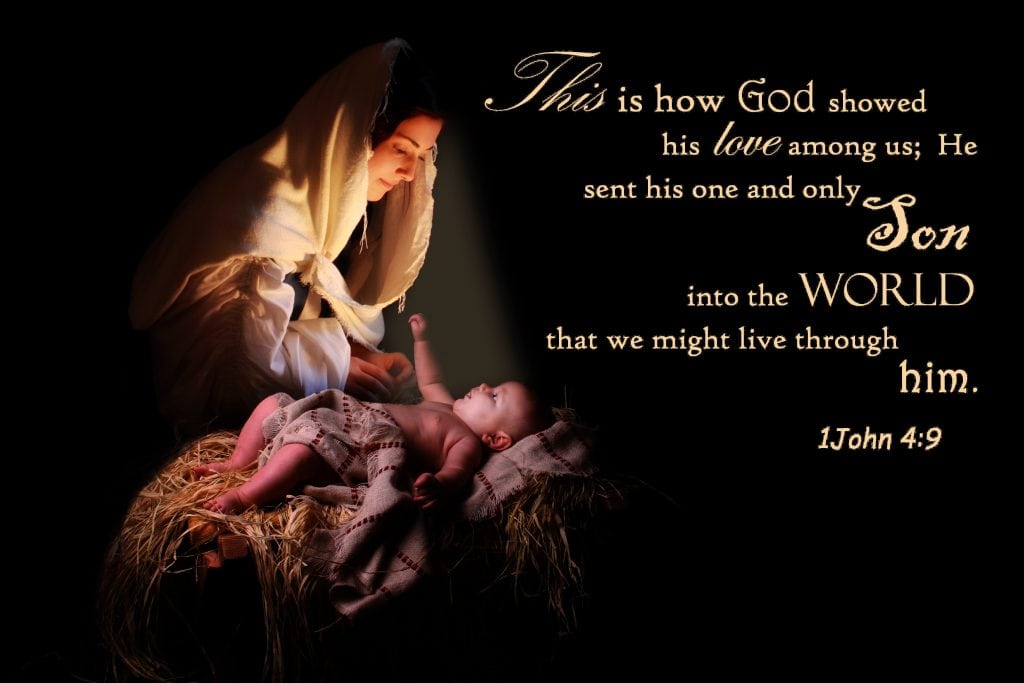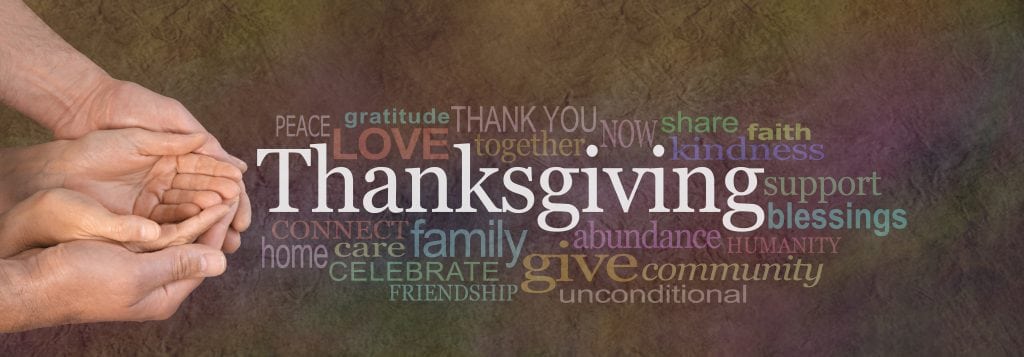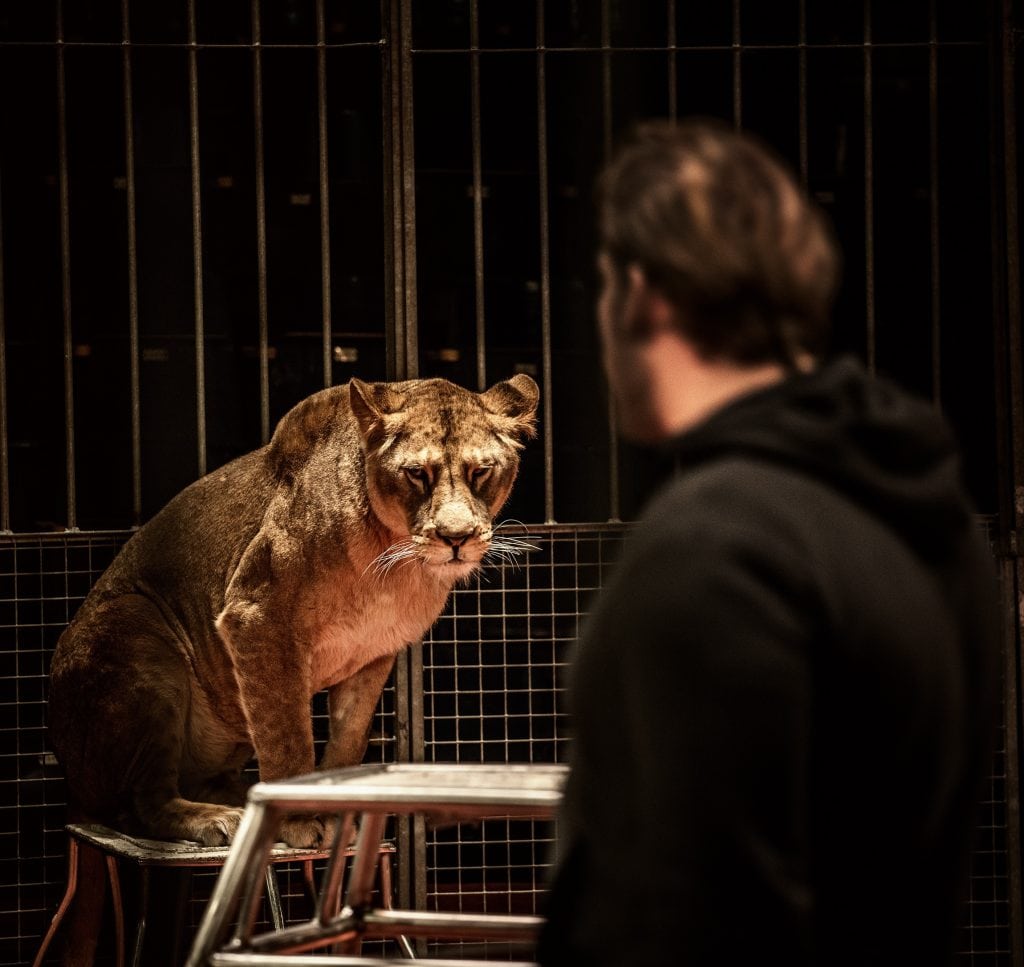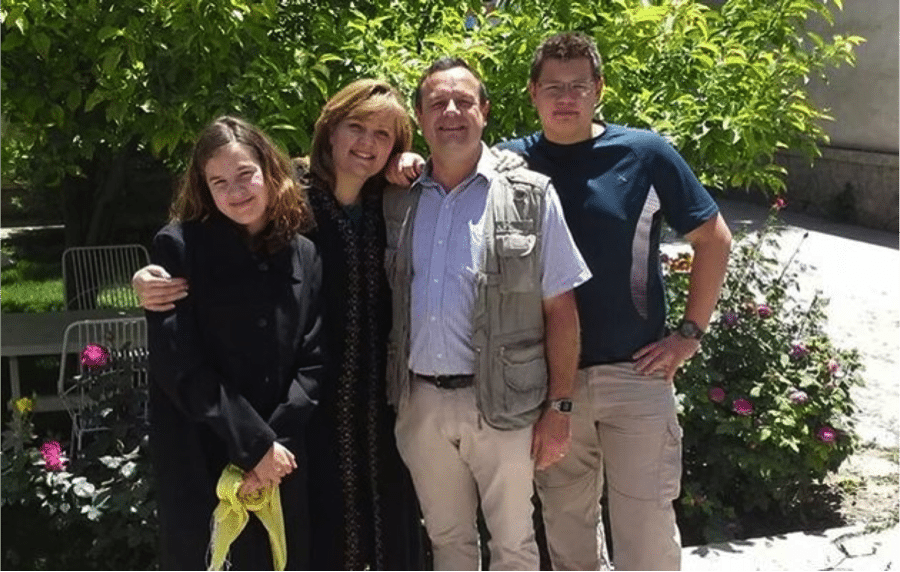filter posts:
Date
It started with a cake
 We have been together to Africa on a mission’s trip, our paths rarely cross. But I love talking to this man because he is one of those individuals who live, it seems, on a completely different plane than the rest of us. I could tell you lots of stories, but I will just share this one.
We have been together to Africa on a mission’s trip, our paths rarely cross. But I love talking to this man because he is one of those individuals who live, it seems, on a completely different plane than the rest of us. I could tell you lots of stories, but I will just share this one.
One day several years ago, Eddie was doing two things that he enjoys the most, walking and praying. Suddenly the Lord interrupted Eddie’s prayers with this thought: While you are praying for missions and missionaries overseas, why not also pray for your neighbors? Eddie said, “OK, I will do just that.” He thought about it for a few minutes and decided to pick the hardest case on the block, a man who was known and avoided by everyone because of his drinking. He was rarely sober but he held down a job, even owned a business. Eddie began to pray for him every day, that God would touch his heart and open it to the gospel of Jesus Christ. He found out one day that the man’s son was celebrating a birthday, so Eddie went to the store and bought a birthday cake and left it in the bag and hung it on his neighbor’s door. Eddie knew he would be coming home for lunch and sure enough, the man called him about 30 seconds after he arrived.
“Did you leave that cake hanging on my door?” the man asked.
“Yes, I did,” Eddie said.
“Why’d you do that?”
“Well, because we are neighbors and I have never really gotten to know you. I knew it was your son’s birthday, so I just wanted to do something neighborly for you. I wanted to show you that I care about you.”
There was a long pause. Then the man asked Eddie if he thought you could still go to heaven if you never went to church. Eddie said yes. “Would you come over and talk to me about that?” the neighbor said. Eddie replied, “You mean now?” The man did mean now, so Eddie told him he would be right over.
Eddie knew his neighbor, who owned a tire store, was wearing coveralls, so he put some coveralls on, too. Then he went over and knocked on his neighbor’s door. When he walked in, and surveyed the scene, the man asked Eddie if he had ever seen anything like it. Eddie said, “Well, only in bars. I admit that I have never seen a house that was, uh, decorated quite like this.” Every wall was plastered with beer signs and beer clocks and beer ads.
They had a long talk that day. Not long after that, the neighbor showed up at Eddie’s home Bible Study. Then, he laid down his addiction to alcohol. Eddie grinned as he talked about the drastic changes that had taken place in this man’s life after he believed the gospel and surrendered to Jesus Christ. I grinned as I thought about this friend of mine, winning the war on sin one lost soul at a time. I am challenged in my own witness when I hear stories like that. I hope you will be, too. As we stand on the threshold of 2017, here’s a great idea I didn’t come up with:
“Go into all the world (or your own neighborhood) and preach the gospel to every creature.” You can always start with a cake.
January 3, 2017
God moves into surrendered hearts
 One verse of “O Little Town of Bethlehem” goes like this: “How silently, how silently, the wondrous gift is given! So God imparts to human hearts the blessings of his heaven. No ear may hear his coming, but in this world of sin, where meek souls will receive him still, the dear Christ enters in.”
One verse of “O Little Town of Bethlehem” goes like this: “How silently, how silently, the wondrous gift is given! So God imparts to human hearts the blessings of his heaven. No ear may hear his coming, but in this world of sin, where meek souls will receive him still, the dear Christ enters in.”
“How will this be?” That’s the question Mary asked the angel Gabriel when he announced the news that she would give birth to a baby boy. It was a legitimate question since Mary had never been with a man. She was betrothed to Joseph, a young carpenter who lived in Nazareth and whose ancestors came from Bethlehem. But they had not consummated their marriage. Mary was a virgin.
Have you ever compared the two visits by Gabriel in Luke 1? Look at the similarities between his visit to the priest, Zechariah, and to the young Jewess, Mary. In each case, he came to foretell a miraculous birth. For Zechariah and his wife Elizabeth, the birth would be a miracle because, to be real honest, they were just too old to have a baby. In Mary’s case, she was not able to conceive because she was a virgin.
In the two angelic visits, Gabriel told the listeners that sons would be born. He even told them their names. He told them their sons would both be great. John, born to Zechariah and Elizabeth, would be great because of the things he would do. Jesus would be great. Period. He was the Son of the Highest, the Holy One, the Son of God.
It is interesting to note the two responses to Gabriel’s message. Gabriel told Zechariah that he had just come from God’s presence, so this news came right from the top. Zechariah asked anyway, “How shall I know this?” In other words, he asked for a sign. “Prove it to me, Gabe, old buddy. I don’t believe it!” Mary responded quite differently. She asked, “How will this be?” Her heart believed what God was saying to her; she just didn’t understand it.
Do you see what is happening here? It doesn’t make sense to Zechariah that he and his wife could have a child; therefore he refuses to believe without a sign. It does not make sense to Mary that she can have a baby and still be a virgin; but she chooses to believe the Lord while seeking to understand. It was Zechariah’s unbelief that motivated his question. It was Mary’s belief that motivated hers.
How did Gabriel respond to each? Zechariah was escorted quickly offstage by Carol Merrill where he received the consolation prize of a tongue that would not work for nine months. Gabriel said to the priest, “You will be silent and unable to speak until the day that these things take place, because you did not believe my words, which will be fulfilled in their time.” Mary’s quest to understand found answers: “The Holy Spirit will come upon you, and the power of the Most High will overshadow you.”
Zechariah’s unbelief led to the sound of silence. Mary’s belief led to a surrendered heart. God moved right in and took up residence. He still does that today, in every heart that is opened to him
May Christ’s presence fill your heart and your home this Christmas.
December 26, 2016
This is your trigger warning
 I wrote this (now updated) column 10 years ago, when “The Nativity Story” came out. It remains one of my favorite Christmas movies.
I wrote this (now updated) column 10 years ago, when “The Nativity Story” came out. It remains one of my favorite Christmas movies.
Hey, lean in closer. I want to tell you something, but I have to be careful. There are lots of those right wing Christians running around here, and I don’t want them to hear what I am about to say. The last thing I need is to be hounded by those people, you know what I mean?
OK, here’s the deal. I know it’s time for “the holidays,” and I just want to warn you about a certain movie that just came out and that you definitely don’t want to see or let your kids see. Under any circumstances, I’m talking. There is no way you should go see this movie because it is highly offensive. I mean, I go in there taking my whole family to see this movie when it comes out, because I think it has something to do with Native American history or something, you know? I had no idea that I was going to be subjected to this blatant violation of the separation of church and state! I mean, here we are, eating our popcorn and enjoying upcoming previews to great flicks that won’t offend nobody, you know what I mean? Movies like this “Trolls” flick or whatever. Yeah, and there’s one about some beasts that is supposedly fantastic. And there’s one about a Bad Santa. I mean, any movie about Santa is fun, you know what I mean? It’s probably good, clean family entertainment that’s not going to be trying to cram some kind of religion or something down your throat.
But this Nativity movie was just plain nasty. It was right up in my face with this whole thing that Christmas is about Jesus or whatever. It made me so mad I could see red. And I really hate when that happens. I try to calm down quick because you know, red is a Christmas color, and whenever I see red or green I have to look down or cross my eyes, so I don’t think about Christmas. Those born-agains got some nerve, you know what I mean? Trying to take over the best time of the year and make it into some religious fanatic fairytale.
So I’m sitting there, you know, with my family, right? I mean, I plunked down like 50 bucks so we could see this Nativity movie, and I wasn’t about to just walk out and throw away 50 bucks. What do you think, I’m crazy or something? So, we sit there and watch this movie, and you have got to be kiddin’ me. I mean, this lady, no, this young girl gets a visit from some guy in white looking like he was an angel or something, and this guy is telling her that she’s going to get pregnant, but there won’t be no man. Yeah, right. But here they go, trottin’ off to Bethlehem because some king wants to get more taxes. Now that part I can believe! Anyway, this young girl has a baby, and every shepherd in the county shows up looking like they’ve never seen a baby before. And these wise guys come too, giving the baby gifts like he was a king or something. The truth? This movie’s offensive. Don’t go. Stay home. It is just wrong.
“And she gave birth to her firstborn Son and wrapped him in swaddling cloths and laid him in a manger, because there was no place for them in the inn.”
December 19, 2016
The source of quarrels and fights
 Thom S. Rainer wrote a blog about church fights he had heard about, and offered commentary (in quotes) on each. Here’s a sampling.
Thom S. Rainer wrote a blog about church fights he had heard about, and offered commentary (in quotes) on each. Here’s a sampling.
A battle over whether to build a children’s playground or to use the land for a cemetery. “I’m dying to know the resolution to this one.”
A fight over which picture of Jesus to put in the foyer. “I just want to know who took the pictures.”
An argument over whether the church should allow deviled eggs at the church meal. “Only if it’s balanced with angel food cake for dessert.”
A disagreement over using the term “potluck” instead of “pot blessing.” “I get it! The concept of luck contradicts the theology of a sovereign God. This issue is very serious. Good luck trying to resolve it.”
These are funny. And sad. But James was not laughing when he wrote to the churches, “What causes quarrels and fights among you?” The answer may surprise you, but it is the same, whether the quarrel is in the bedroom, the boardroom, the church house or the White House. James goes right to the heart of conflict by identifying our passions, our desires, our pleasures as the culprit. What happens when our desire for something is interfered with? You may have seen the commercial where the wife says to her husband, “Don’t forget we’re taking my mom and dad out on the boat this Sunday.” The man grimaces. Then we see him drive his Hyundai to the marina, untie the boat, and shove it away from the dock with his foot. As it drifts away he says, “Not my Sunday.” The voiceover comes up: “Hyundai, the official car of the NFL.”
Here’s the thing. God created us with an incredible capacity for pleasure. He wants us to enjoy the earth He fashioned, and its many delights. But hedonism is a pursuit of pleasure for its own sake. It is the belief that pleasure really is the chief end of man, the reason we exist. If we stumble down that path, we will find ourselves in all kinds of trouble.
A desire for pleasure was the root of David’s sin of adultery with Bathsheba. And it started when he saw her taking a bath on a nearby rooftop. There were three “ways of escape” the Lord gave him, I believe, that David blew right past in pursuit of the fulfillment of his lusts. First, it was spring, “when kings went out to war.” Not David. Not that spring. Second, when he got his first glimpse of Bathsheba, he could have turned away, shut his chamber windows, and taken a cold shower. Nope. Third, when his servant delivered Bathsheba to his door, he could have sent her back home, and fallen on his face and repented. He did not. Instead, he coveted another man’s wife. Then he stole her. Then he had her husband killed.
Ok, if the pursuit of pleasure for its own sake leads to empty lives at best, and destroyed lives at worst, what then?
John Piper argues for a pursuit of pleasure in God, something he calls Christian Hedonism. “My shortest summary of it is this — God is most glorified in us when we are most satisfied in him. Or: The chief end of man is to glorify God by enjoying him forever. Does Christian Hedonism make a god out of pleasure? No. It says that we all make a god out of what we take most pleasure in. My life is devoted to helping people make God their God by wakening in them the greatest pleasures in him.”
December 12, 2016
There is No Good Reason for a Gloomy Christian
 I read about a pastor who had this encounter with a supermarket clerk one day. As she scanned his savings card and his name came up on her computer, she stopped and looked him in the eye. “We always know when your church lets out on a Sunday—saddest, meanest group we deal with all week long.”
I read about a pastor who had this encounter with a supermarket clerk one day. As she scanned his savings card and his name came up on her computer, she stopped and looked him in the eye. “We always know when your church lets out on a Sunday—saddest, meanest group we deal with all week long.”
Ouch. How could the people who claim to have found the answer to their greatest problem—their sin—be the gloomiest, most hateful people who walk the streets? Furthermore, what does a gloomy Christian get out of being gloomy? Do we honestly suppose that by frowning and shuffling through life, not looking people in the eye, not thanking those who serve us for a job well done, not greeting people with a smile…do we honestly suppose that our day goes better as a result? Do we really believe that if we looked like we were weaned on a sour pickle that it will bless those around us and bring glory to the Lord? Somebody said, “If the joy of the Lord is in your heart, then why don’t you tell your face about it?”
Hannah Whitall Smith wrote about this very problem many years ago in a book called, “The Christian’s Secret of a Happy Life.”
I once heard of a poor woman who earned a precarious living by daily labor, but who was a joyous, triumphant Christian. “Ah, Nancy,” said a gloomy Christian lady to her one day, who almost disapproved of her constant cheerfulness, and yet envied it.
“Ah, Nancy, it is all well enough to be happy now, but I think the thoughts of your future would sober you. Only suppose, for instance, that you would have a spell of sickness, and be unable to work. Suppose your present employers should move away and no one else would give you anything to do. Suppose…” “Stop!” cried Nancy, “I never suppose. The Lord is my Shepherd, and I know I shall not want. And,” she added to her gloomy friend, “it is all those ‘supposes’ that are making you so miserable. You better give them all up and just trust the Lord.”
Nothing else but seeing God in everything will make us loving and patient with those who annoy and trouble us. They will then only be the instruments for accomplishing His tender and wise purposes toward us, and we will even find ourselves inwardly thanking them for the blessings they bring.
Mrs. Smith may have stumbled onto something that we would do well to investigate. She didn’t make this stuff up, you know. It was Paul who wrote from a jail cell: “Rejoice in the Lord always; again I will say, rejoice.” It was Jesus who cried from the cross: “Father, forgive them, for they know not what they do.” It was David who said while running for his life from King Saul: “I have set the Lord always before me…therefore my heart is glad, and my whole being rejoices; my flesh also dwells secure.”
So, even if you are in prison for something you did not do, or being crucified for sins that belong to others or being chased down by bloodthirsty men, you can rejoice. And since I wager none of my readers fall into those three categories…why aren’t we smiling? What in the world have we got to be gloomy about? Is there any reason why we cannot be the most joyful people on the planet? Give up your ‘supposes’ and give thanks to the Lord.
Thanksgiving is not a holiday. It is a way of life.
November 28, 2016
Take time to give thanks
 It is at this time of year when many people, regardless of their spiritual condition or social status, begin to reflect on giving thanks. I have always wondered whom atheists thank for their many blessings. Could their doxology possibly be, “Praise no one from whom all blessings flow”? That doesn’t just sound hollow, it sounds ridiculous because any thinking individual knows that the very air he breathes is a gift, the sunshine that warms his tomatoes is a wonder, the ground that supports his every step is a benevolence.
It is at this time of year when many people, regardless of their spiritual condition or social status, begin to reflect on giving thanks. I have always wondered whom atheists thank for their many blessings. Could their doxology possibly be, “Praise no one from whom all blessings flow”? That doesn’t just sound hollow, it sounds ridiculous because any thinking individual knows that the very air he breathes is a gift, the sunshine that warms his tomatoes is a wonder, the ground that supports his every step is a benevolence.
Paul said, “What do you have that you did not receive?” Indeed. The question is not, “Where do I start to give thanks for the blessings I have been given,” but, “Where would I stop?”
Here are a few of my blessings that I share with you, in the hopes that my ramblings may provoke you to consider your own life and how God has been generous with you.
I am most thankful for the Lord who chose to save me. I shudder to think where I would be right now, what I would be doing, what days of quiet desperation I would be living without the presence of Jesus Christ in my life. How does anyone navigate the normal trials and tribulations of life without the one who is life and strength and hope? That is indeed a question for the ages.
I am thankful for my precious wife of 34 years. I love to tell the story of how God used Cindy to turn me around 180 degrees. While I was intent on pursuing my own goals and satisfying my own selfish ambitions, God had me bump into this young lady in Chapel Hill who was serving the Lord the way I knew I was supposed to. Cindy is my best friend and the love of my life.
I am thankful for seven children and the wonderful spouses four of them have found. They keep us laughing, praying, and rejoicing that they know Jesus. As John said, “I have no greater joy than to hear that my children are walking in the truth.” I love my children and five grandchildren and cannot begin to measure all that they have taught me.
I am thankful to be part of the body of Christ in a local church, people who have stood by me through the loss of loved ones, personal health issues, and struggles with my own sinful heart. If you are in a fellowship that still believes the Bible is true and that Jesus is our only hope for salvation, that the purpose of church is to equip the saints to do the work of ministry, that loves to give people and money to missions, that is filled with folks who really do love the Lord and each other…you are greatly blessed. Church is not a service or a building or even a group of people who just like to be together and think the same way. The church is the body of Christ, which he purchased with his own blood, and which he is building. Our hope is not and has never been in the political process, but in the Lord. His Kingdom is eternal, and will never be shaken.
There is much more I give thanks for today, including the opportunity the Times-News has given me to write this column each week. How about you? What are you thankful for today? Write it down, shout it out, and mostly, tell the Lord about it. He is, after all, the one who has given you all that you have.
November 21, 2016
Only God can tame this beast
 What weighs less than two ounces, works almost constantly for 16 hours a day, and cannot be controlled by either man or woman? The mighty tongue. I know what Charles Wesley meant when he wrote “O for a Thousand Tongues to Sing,” but we just couldn’t survive it. 999 of them would be gossiping or backbiting or complaining, while the one would be singing “our great redeemer’s praise.” No thanks, Charles. One is plenty.
What weighs less than two ounces, works almost constantly for 16 hours a day, and cannot be controlled by either man or woman? The mighty tongue. I know what Charles Wesley meant when he wrote “O for a Thousand Tongues to Sing,” but we just couldn’t survive it. 999 of them would be gossiping or backbiting or complaining, while the one would be singing “our great redeemer’s praise.” No thanks, Charles. One is plenty.
A family sat around the table for breakfast one morning. As was his custom, the father prayed and thanked God for the food. Immediately afterwards, as was also his habit, he began to grumble about the food and how it was prepared. His young daughter said, “Daddy, do you think God heard what you said when you thanked Him for the food?” “Certainly,” replied the father with confidence. “And did He hear you when you said bad things about the food?” “Of course,” the father replied, hesitantly. His little girl said, “Daddy, which did God believe?”
James illustrates the power of the tongue to direct, destroy, and to delight (or deceive) in his third chapter. The first word picture compares the tongue to a bit. A bit is put into a horse’s mouth so that a 60-pound kid can direct a 1,000-pound horse. One of my dad’s decisions when I was growing up was to buy a Palomino and keep him pastured offsite. I remember going over to ride Sundance on occasion. Every time I did, the horse would obey my instructions given through the bit and bridle for a little while, and I could set my watch by what happened next. After 10 minutes, he would get tired of the whole thing, because he knew somehow that I was really not in charge, and he would take off for the trees. Gaining speed as he got closer, all while I am pulling back on the reins and yelling, Sundance would go straight for the low branches to try to knock me off. That horse was evil. No, he was just like me as a young man, and sometimes as an older man. He did what he wanted to do; he was not going to be controlled by someone else. When the horse submits to the bit, then the rider has control over the horse’s whole body, and the ride is a pleasure for both. So it is with the tongue.
The tongue boasts of great things, James says, and it can be used to direct a nation toward good or evil. On Aug. 20, 1940, Winston Churchill said to the House of Commons, “Never in the field of human conflict was so much owed by so many to so few.” He said this to praise the courage of the Royal Air Force pilots in their ongoing battle against German warplanes engaged in nightly bombings of the city of London. On his way to give the speech that day, Churchill was going over his speech. He had planned to say, “Never in the history of mankind have so many owed so much to so few.” His chief military assistant, Pug Ismay, said, “What about Jesus and His disciples?” Churchill smiled and said, “Good ‘ol Pug,” and he changed his speech, to “Never in the field of human conflict…”
The tongue of one man, Churchill, directed a nation, and gave them courage in the face of an enemy. On the other hand, someone has calculated that for every one word of Hitler’s autobiography, Mein Kampf, 125 lives were lost in World War II.
Only God can tame the tongue.
November 14, 2016
A difficult year to judge the presidential candidates
 Samuel looked at the Jesse’s sons to see which one the Lord would choose as king to replace Saul. As soon as the prophet laid eyes on Jesse’s firstborn, Eliab, he thought, “Surely this is the one!” But then the Lord said, “Do not look at his appearance or on the height of his stature, because I have rejected him. For the Lord sees not as man sees; man looks on the outward appearance, but the Lord looks on the heart.”
Samuel looked at the Jesse’s sons to see which one the Lord would choose as king to replace Saul. As soon as the prophet laid eyes on Jesse’s firstborn, Eliab, he thought, “Surely this is the one!” But then the Lord said, “Do not look at his appearance or on the height of his stature, because I have rejected him. For the Lord sees not as man sees; man looks on the outward appearance, but the Lord looks on the heart.”
I think Samuel learned a lesson that day, namely, that things are not always as they appear. I hope we have learned our lesson, as well, and will not choose the next president based on what our eyes see or what our ears hear. I pray that we do not choose a president because of fear. My prayer is that we will go into the voting booth this week and pull the lever for the candidate we believe will serve this country according to principles that best reflect biblical truth. Samuel was impressed with Eliab’s stature because, well, he just “looked like a king.” But God said, “I look at the heart.”
One reason for our downward slide as a nation is, in my opinion, we began electing men and women to office because of their promises instead of their character. I understand that it is human nature to judge a man based on his appearance and his speech, but there was a day in our country when that was less important than a person’s moral values and clear conscience. When we elect men or women to office because they speak well, we reveal the shallowness of our own thinking about who is best equipped to lead. When we base our vote on which candidate will do the most to make us more prosperous, we indict our own hearts for selfishness and greed. When we pull the lever for the man or woman who will load us down with entitlements rather than lead us, we betray our own misguided motives about what government was first created by God to do.
This is a difficult year to judge a candidate for the Oval Office based on character, isn’t it? But I urge you to resist the temptation to throw up your hands and decide you will sit this one out. To those who read this column and who belong to Jesus Christ, I would ask…What is our responsibility as Christians? I believe as we approach an election, we are first called to pray and ask the Lord for wisdom about the candidates. Every one of them is a sinner, just as we are, and the job of Messiah is already taken. None need apply. Ask the Lord to show us all which sinner He has chosen to lead this nation. Second, go and vote. Once. Finally, whatever the outcome, pray for those who have been elected. Paul wrote, “First of all, I urge that supplications… be made for all people, for kings and all who are in high positions, that we may lead a peaceful and quiet life, godly and dignified in every way.”
Plato said, “The penalty that good men pay for not being interested in politics is to be governed by men (and women) worse than themselves.” May God give us wisdom and humility to be able to see what He sees, and to base our vote on the principles of the candidate, not on the appearance or the speech or the promises of a man or a woman. And may God have mercy on this nation.
November 7, 2016
Faith is obeying God in spite of consequence
 Someone has said that faith is not “believing in spite of evidence but obeying in spite of consequence.” Abraham did that. He left his home at God’s command, and went to a place he knew nothing about. He obeyed God when he was told to take Isaac as a boy and sacrifice him on an altar. If you don’t know the story, read it in Genesis 22, and see how God stopped Abraham from carrying out the deed, but saw in his heart that Abraham loved God and believed that even if Isaac were slain, God would resurrect him to be the son of promise. Abraham obeyed in spite of consequence.
Someone has said that faith is not “believing in spite of evidence but obeying in spite of consequence.” Abraham did that. He left his home at God’s command, and went to a place he knew nothing about. He obeyed God when he was told to take Isaac as a boy and sacrifice him on an altar. If you don’t know the story, read it in Genesis 22, and see how God stopped Abraham from carrying out the deed, but saw in his heart that Abraham loved God and believed that even if Isaac were slain, God would resurrect him to be the son of promise. Abraham obeyed in spite of consequence.
That’s the story of the Groenewald family. Werner Groenewald was a South African pastor, married to Hannelie, a trauma doctor. Inspired by the terrorist attacks on the United States in 2001, Werner and Hannelie began to seek the Lord about how and where they should live. When they visited Pakistan and Afghanistan with a medical team in 2002, the direction of their lives was forever changed. Hannelie said, “We felt the touch of the Holy Spirit. I just started crying and knew that Afghanistan or Pakistan, wherever the Lord calls you, can be your home.”
In August of 2003, the Groenewald family moved to Afghanistan with their son Jean-Pierre, 5, and their daughter Rode, 3. Their families thought they were crazy to leave South Africa and move to this war-torn country where they knew they could be killed. But the certainty of their call and the support of their church gave them courage.
They served in Afghanistan for 11 years, she as a doctor and he as a teacher. On Nov. 29, 2014, Hannelie was working at the clinic, and Werner was teaching leadership to Afghan students in his home. Jean-Pierre, 17, had been playing guitar in his room and chatting with friends on social media. Rode, 15, had spent the day crocheting, and working on her computer. Late that afternoon, Afghan rebels broke into the compound where the Groenewalds lived. Confronted by the guard, the rebels shot and killed him. When Werner heard the shot he sent his students to another room to take shelter, and began to climb the stairs to protect his children. As Werner ascended the rebels burst in and shot him three times, killing him. The rebels then killed Jean-Pierre, Rode, and most of the Afghan students who were hiding throughout the house.
Hannelie says nearly two years later, “It is well with my soul.” Though finding this peace was not easy, she knows God was always there for her family. She remembers Werner’s words just a month before the attack: “We die only once. It might as well be for Christ.” Hannelie said that her only regret was that she wasn’t there with her family when they died. “I wanted to be there, especially with the children, to just embrace them and hold them and face the bullets.”
Hannelie continues to share her testimony with anyone who will listen; and looking back on her family’s journey, she says she wouldn’t change a thing. “We had a clear calling. We had a mandate with this; we counted the cost. We knew that something like this could happen. God allowed that for a reason.” Then she said, about her family members who had been killed, “I know they are actually chasing me on to finish the race as well. I believe one day Jean-Pierre will say, ‘Mom, what took you so long to get here?’ I believe they are where they are supposed to be, on Jesus’ lap, and I cannot wait to get there as well. But I have to finish this race for the Lord.”
October 31, 2016
Motivation for the times we face today
 As we slog through a very painful election cycle, I am reminded of a book I read several years ago. John Piper’s book, “Don’t Waste Your Life,” reminds us of what is significant when we can easily feel bludgeoned or discouraged by what we see happening in our nation and in the world around us. The book is an easy read, less than 200 pages, and the title is appropriate. Piper hammers the point through 10 chapters that we have been created by God for a purpose, and that all of creation is searching for a “single passion to live by.”
As we slog through a very painful election cycle, I am reminded of a book I read several years ago. John Piper’s book, “Don’t Waste Your Life,” reminds us of what is significant when we can easily feel bludgeoned or discouraged by what we see happening in our nation and in the world around us. The book is an easy read, less than 200 pages, and the title is appropriate. Piper hammers the point through 10 chapters that we have been created by God for a purpose, and that all of creation is searching for a “single passion to live by.”
He recalls the memory from his childhood of his evangelist father leading an elderly man to Christ. The church had prayed for this man for years but he had resisted. But not on this day.
God opened his heart to the Gospel of Christ, and he was saved from his sins and given eternal life. But that did not stop him from sobbing and saying, as the tears ran down his wrinkled face…“I’ve wasted it! I’ve wasted it!”
Piper said that this story gripped his heart as a child more than the stories he had heard of teens killed in car wrecks before they were converted — this story of “an old man weeping that he had wasted his life.”
One chapter in the book is titled, “Risk is Right — Better to Lose Your Life than to Waste It.” Paul wrote, “If God is for us, who can be against us?” If this verse is true and applies to you and me who know Christ, then what are we waiting for? As Woodrow Wilson said, “I would rather fail in a cause that will ultimately triumph than triumph in a cause that will ultimately fail.” And the cause of Christ will triumph!
One of the most challenging stories in Piper’s book was taken from “Flags of Our Fathers,” by James Bradley. This book details the battle for Iwo Jima in World War II and the lives of the six flag-raisers at battle’s end. Here is an excerpt:
Often it was the corpsmen [medics] themselves who died as they tried to preserve life. William Hoopes of Chattanooga was crouching beside a medic named Kelly, who put his head above a protective ridge and placed binoculars to his eyes — just for an instant — to spot a sniper who was peppering his area. In that instant the sniper shot him through the Adam’s apple. Hoopes, a pharmacist’s mate himself, struggled frantically to save his friend. “I took my forceps and reached into his neck to grasp the artery and pinch it off,” Hoopes recalled. “His blood was spurting. He had no speech but his eyes were on me. He knew I was trying to save his life. I tried everything in the world. I couldn’t do it. I tried….And all the while he just looked at me….The last thing he did as the blood spurts became less and less was to pat me on the arm as if to say, ‘That’s all right.’ Then he died.”
John Piper’s plea is that he will be able to come to the end of his life and say to the generation he served and lived in, “For your tomorrow, I gave my today. Not just for your tomorrow on earth, but for the countless tomorrows of your ever-increasing gladness in God.”
Need encouragement in these discouraging times we live in? “Don’t Waste Your Life” will challenge, convict and motivate you. It may even change your life.
October 24, 2016
